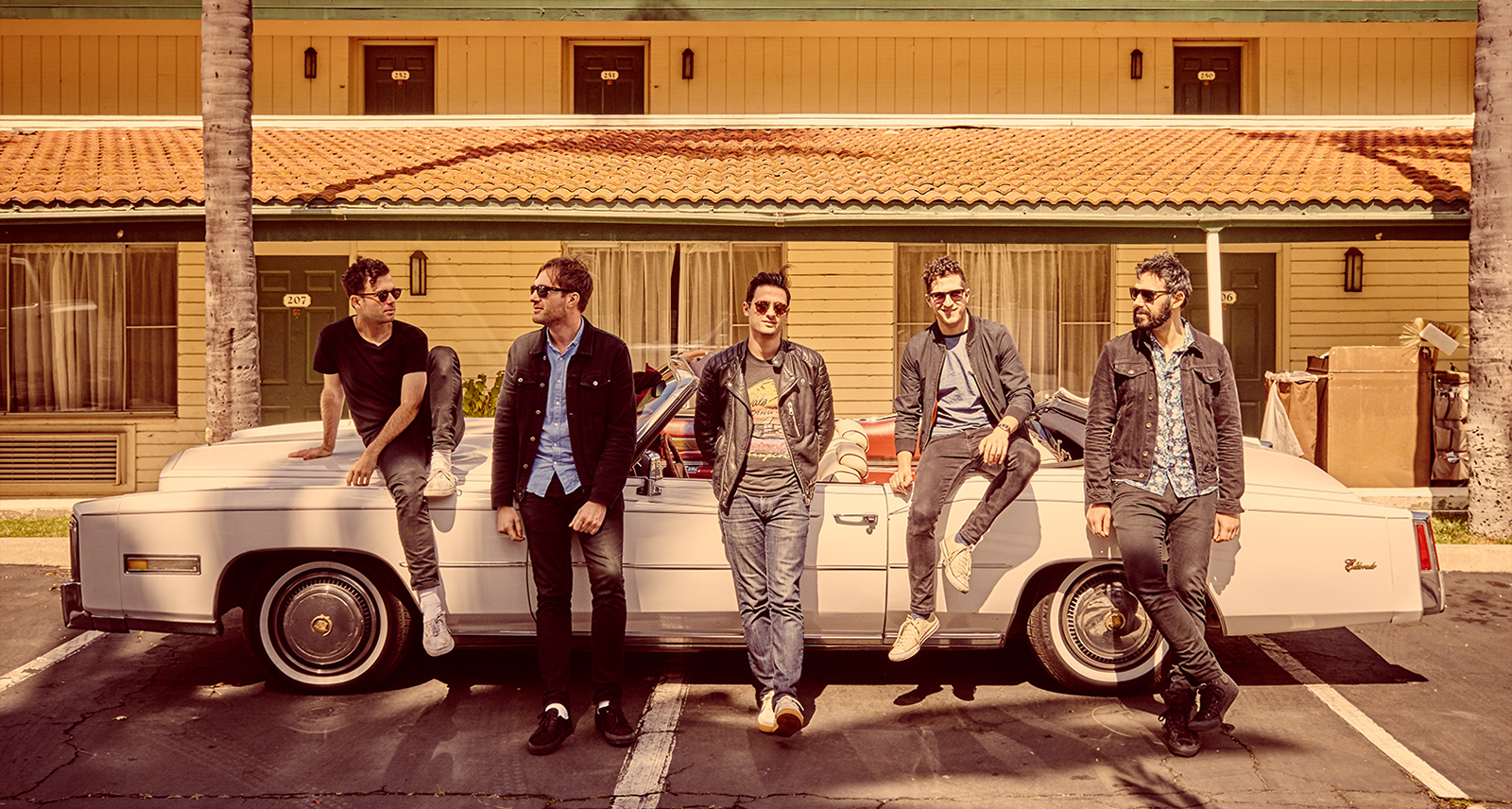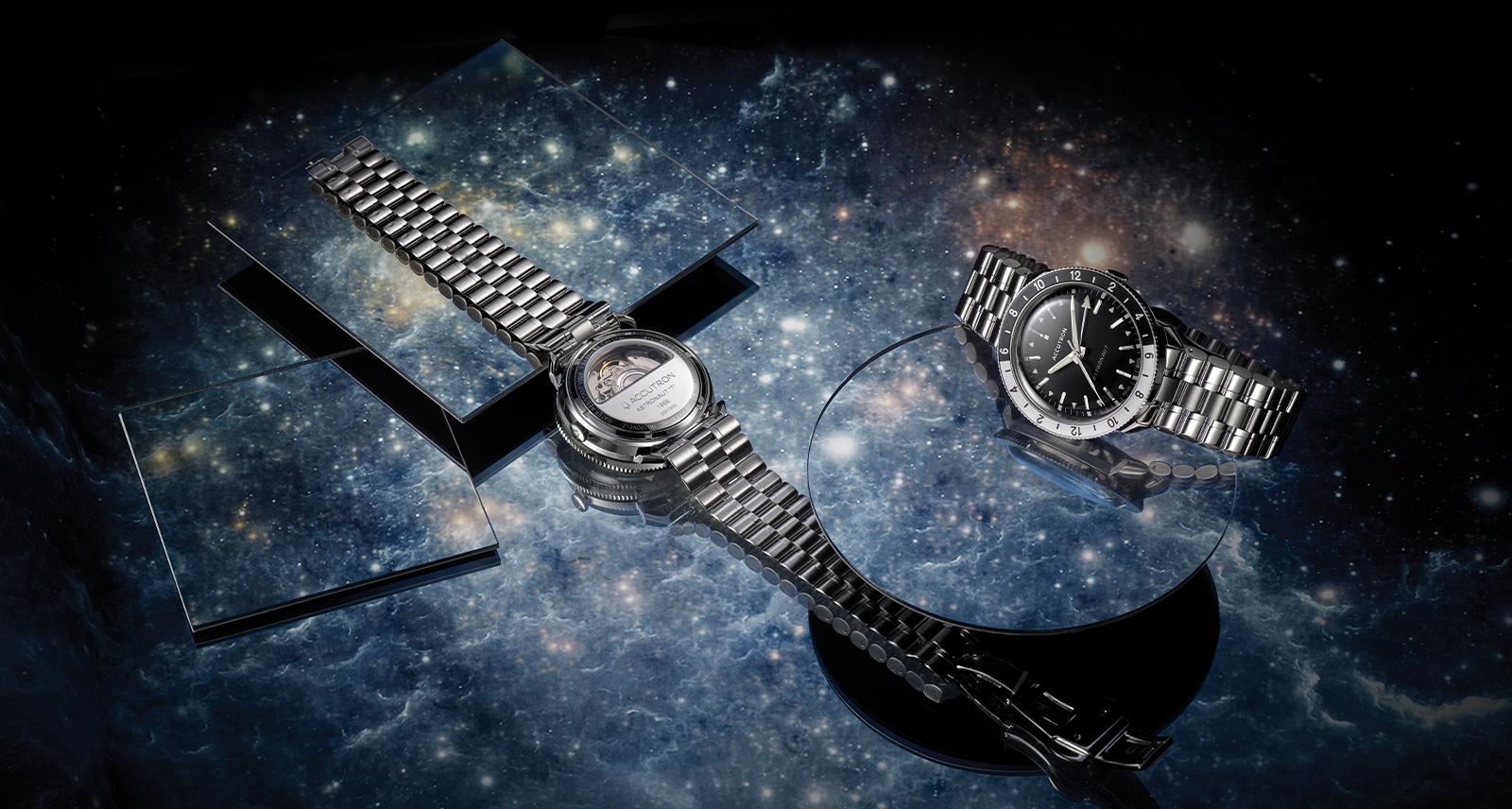Arkells Talk Borrowing From Bieber, Meeting Drake’s Dad, and Conquering America
Think your acid jazz-bebop-mathcore band is a tough sell? Try being a meat-and-potatoes rock band in 2016. With EDM and rap music owning the charts for a minute, rock’s been steadily losing relevancy over the past decade, at times making downright shameful attempts at retaining it. (See: that time U2 force-fed their latest stadium-ready album to half a billion unsuspecting iTunes account holders.)
There are, of course, exceptions. Some-crazy-how, Hamilton, Ontario’s Arkells have managed to thrive playing no-frills, workman-like rock for the last 10 years. Armed with Steeltown grit and frontman Max Kerman’s throaty holler, the fivesome’s become a CanCon institution, notching four Juno Awards, earning gold status on their last album, High Noon, and becoming 2015’s most-played band on Canadian alt-rock radio.
And yet, it appears even Arkells themselves are bored of rock music. Their fourth record, Morning Report, sees them ditch their Springsteenian comfort zone for unapologetically slick pop aspirations. Hell, they’ve even gone as far as writing the lead single about Drake’s dad and packing it full of click-tracked rhythms, electronic pulses, violins and gospel choirs. (Mr. Graham also appears in the video.) Elsewhere, the LP shimmers with all the banging pianos (“Private School”), slow-burning synths (“My Heart’s Always Yours”), and triumphant horns (“Round and Round”) of a band ready to break through Canadian borders into mainstream America. (Seeing as they’ve upped their distribution stateside and have been playing major U.S. festivals this year, it’s a fair assumption to make).
Which is fine and all, but what about keeping it real? What about staying true to your roots, man? We sat down with Kellerman and lead guitarist Mike DeAngelis to ask them what’s it’s like being a self-hating Canadian rock band.
Obviously I want to ask about “Drake’s Dad.” How did this all come about?
Mike: We were on a road trip celebrating a bachelor party for a friend, Julian. Seventeen guys rented three minivans. We were touring around the American south: Memphis, Nashville, and Louisville. And on the first night in Memphis we saw Drake’s dad from across the bar and got very excited. Mostly the song (“Drake’s Dad”) is about friendship, and then on the Sunday night crawling back into bed with your lady and being like, “I missed you so much!” That’s sort of what, mostly, the song’s about. But it’s also about the magic of going out and seeing what can happen over the course of a night, because stuff like that can. If you don’t go out, that would never happen.
So did you party with him?
Mike: We took a photo and like… told him how much we like Drake.
Max: Our friend Adam, who makes an appearance in the song later taking his pants off, he’s the one who recognized Drake’s dad. He was like, that guy in the group who would spot Drake’s dad from across the bar…
Mike: …and get really drunk, and celebrate meeting Drake’s dad, and take off all his clothes. You know? You know everyone has that friend who just gets drunk and…
Max: …it’s like the greatest night of his life now.
Have you guys ever met Drake himself?
Mike: No…
Max: I’ve been saying, though: we’re about the same age, we both grew up in Toronto, we’re both half Jewish, we’re both in music, we both love the Raptors. I feel like we have a lot in common! So, I dunno, when we do meet we’ll have a lot to talk about. So this is like my friend request to him.
I’m hearing a lot more electronic layers and pop elements on Morning Report.
Max: Yeah, and that sort of reflects the music we listen to. Like, if you were to look at our text message group convo where we share records, it’s like, “Hey, have you heard the new Rihanna record? Have you heard the new Bieber record?” I mean, I still love the new Dawes record, or My Morning Jacket, or whatever, but there’s still a lot of really boundary-pushing stuff happening in hip-hop and electronic music, and pop takes from both those things a lot. We’re excited about it. So in our song “And Then Some” on this record, there’s a vocal delay throughout the verse going “ah, ah, ah, ah, ah,” and that’s because Bieber uses that trick a bunch on his latest record. That’s awesome. Let’s use your vocals as a texture! And no one would accuse that song of sounding like a Bieber song, but there are elements from modern music throughout the record.
That’s interesting. In your press release it says you guys feel that rock today has become the most conservative of genres.
Max: It’s the slowest moving genre, probably. I mean, rock ‘n’ roll is supposed to be about not being conservative. It’s supposed to be about being reckless, and not being afraid to take chances.
Mike: Yeah, I think rock ‘n’ roll used to be a really diverse genre. If you go back to the ’50s and ’60s, what rock ‘n’ roll was wasn’t so specific. It was a selection of all different types of music that all sort of were bucking the trends and were without rules. Then, I think in the ’70s and ’80s it really got codified into something so specific. If you weren’t this type of music, or had this type of instrumentation then… Yeah, nowadays it’s kind of nice to just disregard that genre as having rules in general. ‘Cause, as you said, there’s electronic elements, but then there’s like, gospel singers and real horns that we brought into the studio to add texture, and I think that’s also outside of the rock ‘n’ roll norm. It’s just more fun that way.
So would you say rock kind of bores you guys now?
Max: Uhh…. There are still great rock bands writing records and our core is going to be a five-piece rock ‘n’ roll band. That is the show we put on. That’s like, in our DNA. That’s the music we grew up listening to. The main thing is, we just didn’t want to feel key-holed into rock expectations. When it came to making a record, it’s like, “Oh, because we’re a rock band does that mean we just need to plug in our guitars into our amps and hit record? Let’s go!” That would be kind of boring.
Mike: And again, I think if our only influence is rock ‘n’ roll it becomes such an echo chamber, where you’re just being influenced by rock and you’re making more rock. I think also, audiences these days, and we also, have the ability to listen to so many different types of music, and appreciate so many different types of music. I mean, I think we are a rock band, but I think that between the expectations and our influences, we hope there’s something more there.
There are some more personal and sensitive lyrics on this record. Are you taking cues from Drake?
Max: Some of my favourite songwriters do this, and a lot of guys like Kanye do this, and Drake does this sometimes too: just being unafraid to not only be emotional and heartfelt and really brutally honest about a heartbreak situation, but also be funny! And also have a sense of humour. Like, we were talking about Paul Simon yesterday, and he’s got funny lyrics, you know? And Kanye can be hilarious. [On “Drake’s Dad”] when I go, “I do my best thinking, thinking in the shooower. Do my pre-drinking, pre-drinking in the shooower.” That’s sort of the way Kanye would sing it, I think. So the record started off with some sad songs, but I reached a point where I was like, “My God. I’m just another mopey white guy, thinking about my problems.” And that’s all good and fine, ‘cause I like those songs, but there’s more to my personality than that. I’m a gregarious guy. I love laughing. I have a lot of very funny friends. I steal their shit all the time. And I’m glad that this record has a sense of humour, ‘cause that’s another thing that I think is sometimes lost in rock music: rock isn’t always self-deprecating, and I’m kind of a self-deprecating guy.
What’s it like to be a rock band in 2016? In this era of Drakes and Biebers?
Max: It definitely means something to be a rock band now. You know, 10 or 15 years ago if you were a big rock band in Canada, it meant you were like, the biggest thing in Canada. Right? But now, someone’s like, “Oh, you’re in a big rock band?” and that doesn’t necessarily mean what it used to mean.
Mike: Yeah, like, if you go on Spotify and look at the Top 50 songs, none of them are rock songs. Not even one.
Max: And especially, like, five dudes in a rock band. Even that model, which used to be the model, is the furthest thing from the model now. But, all that said, I don’t begrudge the other cultures growing. I think you always have to look — I’m going to sound like an old guy here — you always have to look at the youth to know what’s fresh and what’s happening. Because it’s the youth’s job to go, “Fuck the past. We’re going to forge our own trail. This is what’s good.” ‘Cause that’s what people in the ’70s did, that’s what the youth of the ’80s did, that’s what the youth of the ’90s did. They’d say, “I don’t give a fuck about what my parents are listening to, or whatever people 10 years older than me think is cool, this is what’s cool.” And that’s why I appreciate what electronic music does: they don’t give a fuck. And that’s the evolution of things, you know? And that’s great, and that’s really cool. So all of that said, the fact that we can be a rock band that gets asked to play frosh week shows, still, in 2016, is incredible. And we don’t take it lightly, ‘cause that’s a very formative experience for young people. Mike and I met going to our first welcome week shows, like Sum 41 and Sam Roberts. Those shows meant so much to us. If we can do that for an eighteen year old now, that’s incredible. So we’re very cognizant that rock isn’t the flavour of the day at the moment, but that’s okay.
I know your label Last Gang is putting this record out in the States and you’ve got a bigger distribution team there this time around. Since The Tragically Hip are very much on our minds right now, I’ve got to ask: as a Canadian band, do you worry about coming down with The Hip Syndrome?
Max: The thing where Canadian bands can’t make it in the States? That’s unfortunate. I think that the real syndrome there is that bands in general don’t make it in America. Like, if you’re saying that it’s a Canadian band problem, I don’t know if that’s true. There’s actually, numerically speaking, a lot of Canadian rock bands, Canadian musicians, in the United States.
Mike: Statistically speaking, Canadians have way more of a presence than they ought to.
Max: I think a band like the Tragically Hip is so idiosyncratic and has such subtlety, especially to their words in their music, and I think that that probably made it hard for them to break into a culture that sometimes doesn’t celebrate that — that looks for a more homogenous message. A more direct and simple message.
Mike: I think that’s what Canada loves, and what I love, about the Tragically Hip: the layers to their music.
Max: Yeah, also, when you pull back the curtain a little bit on how decisions get made in the music industry, a lot of the things that can help you move your career along are things like: Were you fucking hanging out at the party with the publicist who books Letterman? Because, is that publicist going to book some random man from Canada, or the dude she sees at the bar three nights a week whose song she really likes, because that guy told her the story of what the song really means? And that’s just human nature. I mean, this is not a complaint at all, I’m just saying there are many reasons why things happen for bands that don’t necessarily have to do with the quality of their music. It sometimes may have to do with their proximity to fucking LA or New York or something. Which is all totally fine. But yeah, when you see how decisions get made, then it’s even more freeing because you’re like, “Okay! If I’m not getting an opportunity, this isn’t necessarily a reflection of me, or the band, or the art we’re creating. It’s more just a reflection of human nature and how business is done.”
Right. You weren’t at the right party at the right time.
Max: Yeah! And I don’t mean to paint a bad picture, ‘cause we’ve been benefactors of that very situation. So I’m not saying that we’re like, above it. But, you know, we’ve gotten to open for bands because we’ve got the same agent. That’s all good and fine. But to just say, “It’s a Canadian syndrome because The Hip never broke out,” it’s like… The Hip fucking played Saturday Night Live! They can play to thousands of people in New York and LA and Chicago and in Amsterdam, and most American bands can’t do that. So, that fucking idea of The Hip Syndrome, it’s complete horseshit as far as I’m concerned.










